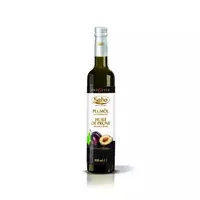Plum oil

Plum seed oil or plum oil is highly valued among lovers of culinary experiments who do not get tired of discovering more and more taste sensations inherent in long-loved dishes. However, it is absolutely not necessary to be a true foodie to appreciate the excellent taste properties of plum oil.
You'll definitely be fascinated by its delightful flavour of bitter almonds, which lends a sophisticated, seductive fragrance to eats and cosmetics. Due to its high vitamin E content, plum oil boasts antioxidant properties and the ability to effectively protect human skin from aging.
Natural plum oil is made from seeds of plum tree fruits, which are thoroughly dried, after which this valuable product is obtained from the core of bones. As a rule, the present plum oil is produced by cold pressing - this method of manufacture ensures the maximum integrity of natural components. Being unrefined (crude), plum oil retains most of the nutrients contained in the feedstock.
In terms of taste, plum oil is not inferior to many other valuable products of this nature. It has a rich almond aroma, which is shaded by fruity notes and marzipan shades with a taste of bitter almonds.
Such properties of plum oil determine its importance in cooking, where it is often used as an excellent dressing for a variety of cold and hot dishes. Even a small addition of plum oil gives the ready-made meals a light almond aroma. Most commonly, plum oil is used as an adjunct to some fish-based dishes (including sushi).
It is also known that natural plum oil can act as a necessary ingredient in the development of desserts and bakery products. Due to the rather high degree of combustion (180 degrees). Real plum bone oil is great for frying.
The composition of plum oil contains up to 92% unsaturated fatty acids, which in turn include linolenic (Omega-
3), linoleic (Omega-
6) and oleic (Omega-
9). Meanwhile, saturated fatty acids are represented by palmitic and stearic, the percentage of which is insignificant.
In addition, a vitamin range is present in this useful product: A, E, F, B, C, along with trace elements such as potassium salts, iron, copper, zinc, calcium, phosphorus and magnesium. It is due to such a rich composition that plum oil can be used as an effective therapeutic agent.
The therapeutic properties of plum oil consist in its therapeutic and preventive effect for the cardiovascular system. In addition, its regular use contributes to the purification of the body by removing slags and improving metabolic processes. For the skin, this oil is also healthy, because it nourishes and moisturizes damaged skin perfectly, refreshing the complexion.
plum oil 899.1 kCal
Energy value of plum oil (Ratio of proteins, fats, carbohydrates - ju):
Proteins: 0 g (~ 0 kCal)
Fats: 99.9 g (~ 899 kCal)
Carbohydrates: 0 g (~ 0 kCal)
Energy ratio (b | y): 0% | 100% | 0%
 Español
Español Français
Français Português
Português Русский
Русский 简体中文
简体中文 繁體中文
繁體中文 日本語
日本語 한국어
한국어 العربية
العربية Türkçe
Türkçe Қазақ
Қазақ Deutsch
Deutsch Italiano
Italiano Українська
Українська
